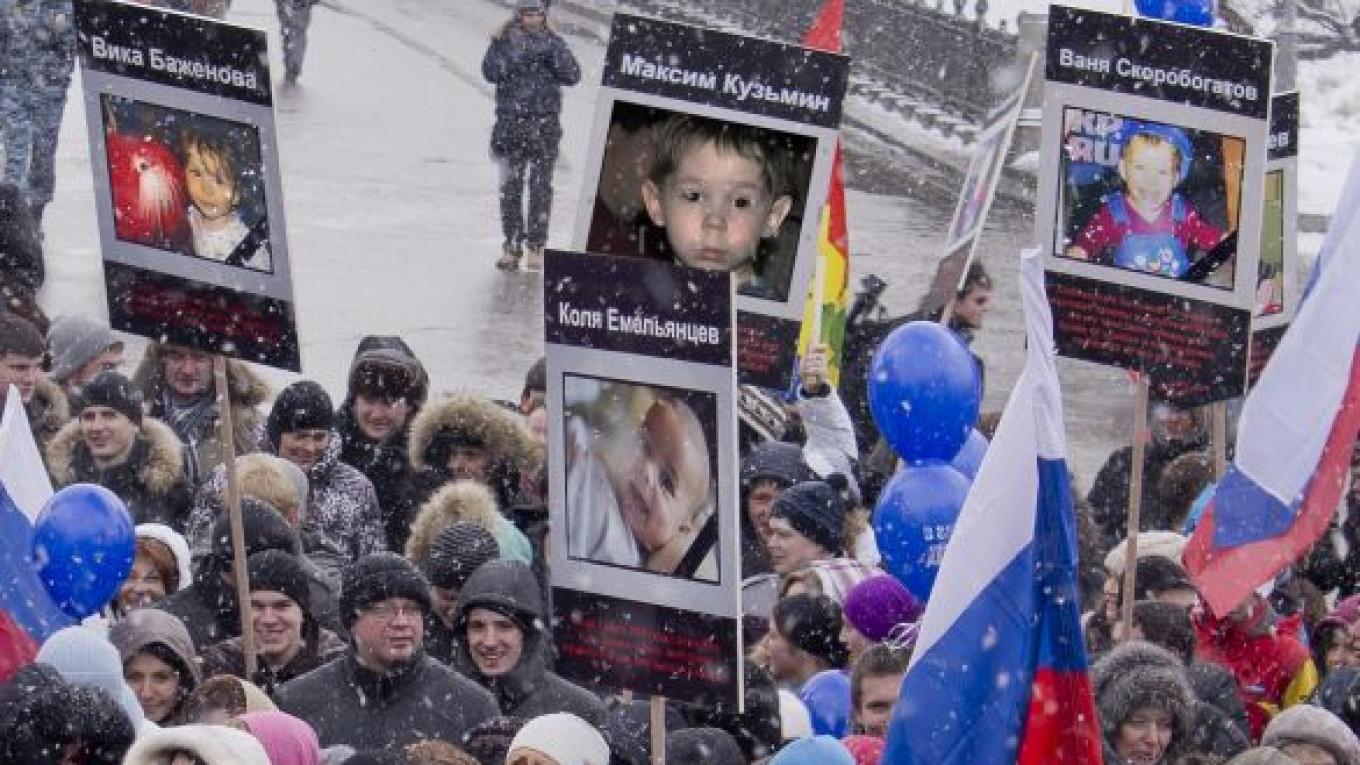Russia the conclusions of U.S. experts that the death of a 3-year-old adopted Russian boy in Texas in January was accidental, the Foreign Ministry said over the weekend.
The U.S. investigation has been "inconclusive," the ministry said in a statement Saturday, demanding that the U.S. authorities provide Russian diplomats with all the documents concerning the postmortem examination of the boy, Max Shatto.
Without the necessary documents, Russia is unable to draw its own conclusions about the circumstances of Shatto's death or decide about further possible actions, the ministry said.
Russian officials reproached the United States for having failed to provide the documents before, saying they were learning from mass media about the progress in the U.S. investigation into Shatto's death.
On early Saturday morning Moscow Time, authorities in the U.S. state of Texas announced that Shatto, whose Russian name was Maxim Kuzmin, died of an accidental blunt trauma "consistent with self injury" and linked to a diagnosed behavioral disorder.
Children's ombudsman Pavel Astakhov initially accused Shatto's adoptive mother, Laura Shatto, of beating and murdering her son, and the Foreign Ministry released a statement blaming parental abuse for the death.
Astakhov had quoted a Texas police official as saying the boy's death "doesn't look natural" and asserted that adoptive father Alan Shatto had confessed to giving Max the antipsychotic drug Risperdal because the boy was hyperactive and "refused to obey" his American parents.
But the latest U.S. expertise concluded that no medicines or other substances found in the boy's body "could have contributed to this death."
News of the incident provoked a furious reaction from senior Russian officials when it appeared last month.
Several lawmakers, including Sergei Mironov, head of the A Just Russia party's State Duma faction, said Shatto's death proved that the government was right to ban U.S. adoptions as of Jan. 1.
The move was widely seen as a response to the U.S. Magnitsky Act passed in December that called for sanctions against Russian officials suspected of human rights abuses.
Americans have adopted an estimated 60,000 Russians in the last two decades. At least 20, including Shatto, are known to have died.
Up to 300 orphans entrusted to Russian families die every year, State Duma Deputy Yelena Mizulina, head of the Duma's Committee on Family, Women and Children, said in late February.
Some Russian and U.S. observers have accused Astakhov of leading a politically motivated campaign against the United States.
Laura Shatto, who said she found her adoptive son unresponsive, may still face charges of negligence and injury to a child by omission, media reports said Saturday. The adoptive father may be similarly charged.
Contact the authors at [email protected] and [email protected]
Related articles:
A Message from The Moscow Times:
Dear readers,
We are facing unprecedented challenges. Russia's Prosecutor General's Office has designated The Moscow Times as an "undesirable" organization, criminalizing our work and putting our staff at risk of prosecution. This follows our earlier unjust labeling as a "foreign agent."
These actions are direct attempts to silence independent journalism in Russia. The authorities claim our work "discredits the decisions of the Russian leadership." We see things differently: we strive to provide accurate, unbiased reporting on Russia.
We, the journalists of The Moscow Times, refuse to be silenced. But to continue our work, we need your help.
Your support, no matter how small, makes a world of difference. If you can, please support us monthly starting from just $2. It's quick to set up, and every contribution makes a significant impact.
By supporting The Moscow Times, you're defending open, independent journalism in the face of repression. Thank you for standing with us.
Remind me later.


